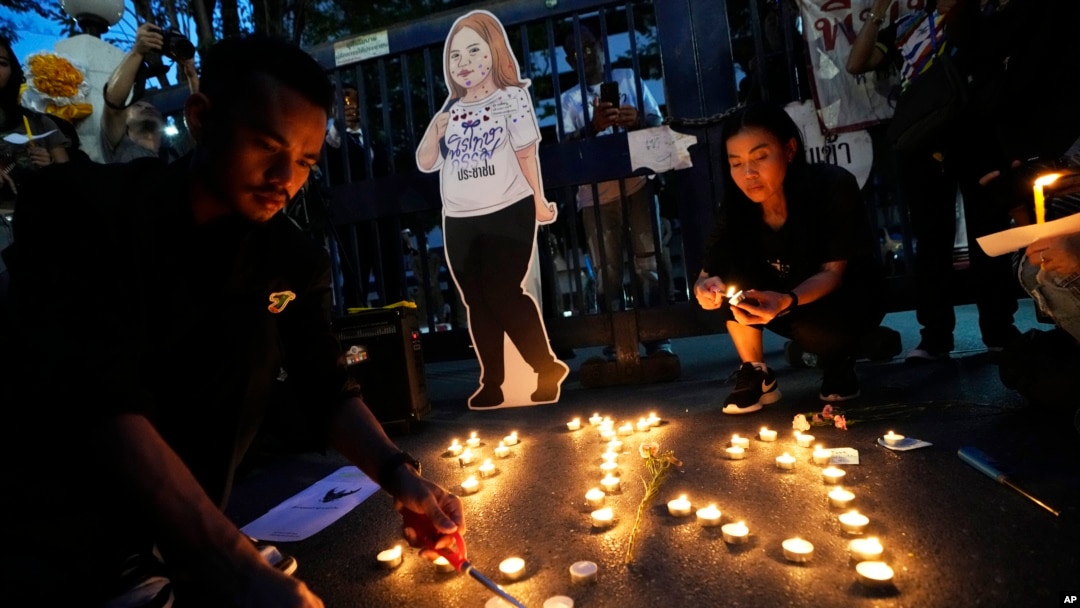Defiance and grief poured out Tuesday after a 28-year-old democracy activist in pretrial detention for allegedly defaming Thailand's powerful monarchy died from heart failure after a two-month hunger strike.
Netiporn Sanesangkhom, better known by her nickname “Bung,” was a prominent youth leader of pro-democracy group Thaluwang, which emerged during anti-government protests in 2020-22 and was strident in its calls for reform of the monarchy, an institution seen as untouchable before those rallies rocked the country.
She was detained and denied bail in January on charges including royal defamation after she was accused of conducting two public polls on the monarchy as protests raged across Thailand, according to Thai Lawyers for Human Rights.
She spent nearly four months in detention awaiting trial, entering a hunger strike for the last two months of that period, her lawyers said.
The Corrections Department released a statement saying she went into cardiac arrest Tuesday morning and “wasn’t responsive to the treatment, which led her to die peacefully at 11:22 a.m.” It promised a thorough autopsy.
Candlelit memorials were held in Bangkok and the northern cities of Chiang Mai and Lampang on Tuesday night as a stunned democracy movement digested the news of the young woman's death.
Outside the Criminal Court in Bangkok several dozen mourners gathered around a large candle memorial in the shape of Bung's name.
"Nobody should die because of the unjust Thai justice system," 19-year-old Noppasin Treelayapewat told VOA, noting he was a minor some two and a half years ago when he was charged with violating Section 112, or royal defamation.
"Today, I believe many can see that someone has died because of Section 112 of the criminal code," said Noppasin, who faces up to 15 years if convicted.
U.S. Ambassador to Thailand Robert F. Godec was among several Western envoys to swiftly express their condolences over the activist's passing, saying in a post on X he was "saddened by the tragic death of Bung," highlighting the diplomatic questions likely to face the government in Bangkok over coming days.
Irene Khan, U.N. Special Rapporteur for Freedom of Opinion and Expression, added her voice to the mounting outcry.
"Saddened & distressed at death of detained political activist Bung Thaluwang," Khan said in a post on X. She also urged Thailand to "abolish lese majeste & detention/prosecution for exercising" freedom of expression.
Royal defamation carries up to 15 years in jail for each conviction.
It has been used against 270 mainly young pro-democracy activists who rocked Thailand with massive rallies calling for systemic reforms of the country's economy, politics and — most controversially — the role of the monarchy in one of Asia's least equal countries.
Many of them have been denied bail automatically by the courts, as the establishment ties up key protest leaders in legal cases.
There are believed to be at least two other women activists on hunger strikes while in detention for charges including royal defamation.
"Her [Bung's] death is a shocking reminder that Thai authorities are denying activists their right to temporary release on bail and using detention to silence the peaceful expression of dissent," Amnesty International Thailand said in a statement.
Reform and division
Reform of the royal defamation law is now a clear dividing line between many young Thais who voted in the millions for the progressive Move Forward Party (MFP) and older conservatives, many of whom revere the monarchy and the status quo.
The monarchy is backed up by business tycoons, politicians and Thailand's army, which has carried out 13 coups in under a century.
MFP stunned the establishment by winning an election a year ago with a radical reform agenda, including reform of the 112 law.
But MFP was blocked from forming a government by the conservative Senate.
Now, over the coming weeks the MFP faces a court ruling that may see it dissolved for its campaign pledge to reform the law.
In its place, and leading the government, is a coalition of conservatives patched together by the poll runners-up Pheu Thai party, founded by billionaire ex-premier Thaksin Shinawatra.
The ruling coalition vowed not to touch the royal defamation law. Experts say that was part of a pact with the royalist establishment to help it elbow aside the MFP in exchange for a royal pardon for Thaksin, who returned to Thailand last year after a 15-year self-exile to serve a reduced sentence for corruption convictions but did not sleep one night in jail before being released on parole.
Pheu Thai's Prime Minister Srettha Thavisin, a real estate mogul and Shinawatra ally, last September told the United Nations General Assembly in New York that Thailand was ready to join the Human Rights Council as Southeast Asia's candidate for 2025-2027, reaffirming his government's "sincere commitment to the advancement of human rights at home and abroad."
But free speech advocates say Bung's death while in pretrial detention is an example of why Thailand is not ready to join the global rights forum.
"We will continue campaigning for our demands to be met and one of them is that Thailand should not be allowed to stand for election to the U.N. Human Rights Council," a tearful Kittitach Sriamrung, a friend of Bung's, told reporters.
The issue is likely to be awkward for Srettha's government, as the 112 law comes back under scrutiny just as he seeks to drive through his government's economic plans and put distance between his administration and the political troubles caused by last year's divisive election.
New rounds of protests may also be possible in Thailand's messy politics.
"Bung died, but her quest to see the change hasn't. … we will continue our work to see it through for her," pro-democracy leader Panusaya 'Rung' Sithijirawattanakul, who gave the first monarchy reform speech in 2020 and also faces royal defamation charges, said in a video post on social media.
Some information for this report came from Agence France-Presse.


